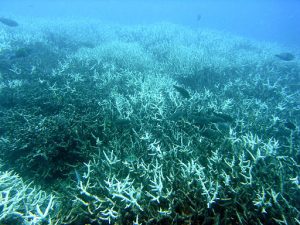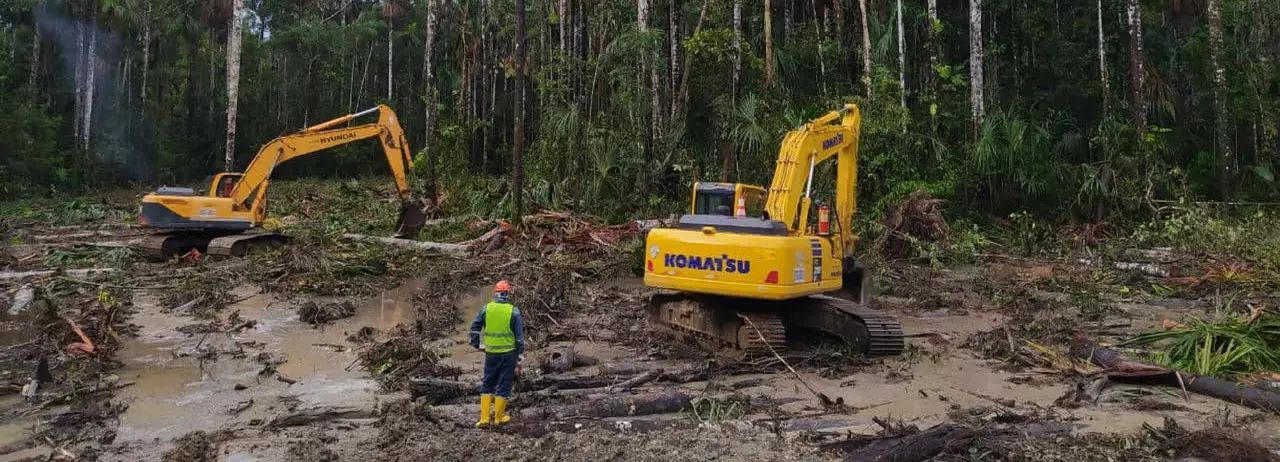“This is a sure sign that climate change caused by burning coal, oil, and gas is threatening the very existence of our reef,” said one campaigner.
By Andrea Germanos. Published 3-18-2022 by Common Dreams
An assessment of the Great Barrier Reef’s health released Friday reveals widespread bleaching of the world’s largest coral organism, sparking fresh demands for the Australian government to ditch fossil fuels and finally commit to protecting both the UNESCO site and planetary health.
“While not yet officially declared a mass bleaching event, this is still disastrous news for our reef, the marine life, and communities that rely on its health,” said Dr. Lissa Schindler, Great Barrier Reef campaign manager with the Australian Marine Conservation Society (AMCS).
The March 18 update from the Great Barrier Reef Marine Park Authority suggests a fourth major bleaching event since 2016 is underway and points to warmer than average sea surface temperatures—0.5−2°C above average throughout the park, with some areas ranging 2−4°C above average.
“Bleaching has been detected across the marine park—it is widespread but variable, across multiple regions, ranging in impact from minor to severe,” the assessment states.
“Most observations of bleaching have been of paling or fluorescing,” the update continues, “but several locations have whole colonies bleached white”—a status “consistent with the patterns of heat stress experienced on the reef this summer.”
This is the fourth bleaching event since 2016 – that’s a rate of more than once every two years.⚠️This devastating news comes as new research shows Australia is set to blow its emissions budget by more than double. (short thread) pic.twitter.com/G7mVTADnvz
— WWF_Australia (@WWF_Australia) March 18, 2022
Of particular note, say reef defenders, is that the widespread bleaching comes during a La Niña year, which can help cool waters.
“This is a sure sign that climate change caused by burning coal, oil, and gas is threatening the very existence of our reef,” declared Greenpeace Australia Pacific climate impacts campaigner Martin Zavan.
According to bleaching expert Prof. Terry Hughes, “Corals on the Great Barrier Reef are not supposed to bleach in cooler La Niña summers. 2022 is a first, thanks to anthropogenic heating.”
Hughes also pointed to the marine park authority’s aerial surveys that “reveal (so far) a footprint of mass bleaching similar to 2017, when the central 500km region was hardest hit.”
“How many more maps will it take to trigger real reductions in greenhouse gas emissions?” he asked.
Scientists were shocked by the severity & scale of coral bleaching on the #GreatBarrierReef in 1998, the hottest year (then) on record.
It set the benchmark for “mass” bleaching.
And then it got worse & more frequent.
Bleaching in 2022 is the 4th time in just 6 years. pic.twitter.com/x2JdhJOAWZ
— Terry Hughes (@ProfTerryHughes) March 16, 2022
The right-wing government of Prime Minister Scott Morrison has faced sustained criticism from climate campaigners for doubling down on fossil fuel projects amid the planetary emergency. The prime minister also drew sharp criticism last year after launching a successful lobbying effort to keep the reef off a list of World Heritage Sites considered “in danger.” Reporting earlier this month that the Australian government pushed for the Intergovernmental Panel on Climate Change to soften its assessment of the reef being “in crisis” sparked additional criticism.
In a lengthy Twitter thread Friday, Greenpeace Australia Pacific CEO David Ritter debunked Morrison’s claims of having protected the reef and pointed to the government’s multiple climate failures.
“Preserving the reef would require clear and meaningful climate action, like a meaningful net-zero plan and a moratorium on new coal, oil, and gas projects,” said Ritter. “Instead, Australia was recently ranked last out of 170 nations for climate action.”
Ritter also noted that last year his group “delivered legal notice directly to Scott Morrison [and] advised he is in breach of his World Heritage Treaty obligations to protect the reef.”
“So, it’s time to cut the crap,” he added. “We know the reef is in danger, but we also know how to protect it.”
Addressing the prime minister, Ritter said, “Do your job to safeguard Australians and our magnificent natural heritage, by speeding up our transition to clean energy and urgently phasing out fossil fuels.”
The update was released just days before UNESCO’s reef monitoring mission begins.
AMCS’s Schindler said that the mission delegates must “witness the severity and widespread nature of this devastating event and while out there the Morrison government should explain to the mission why they continue to approve and cut red tape for fossil fuel projects.”




